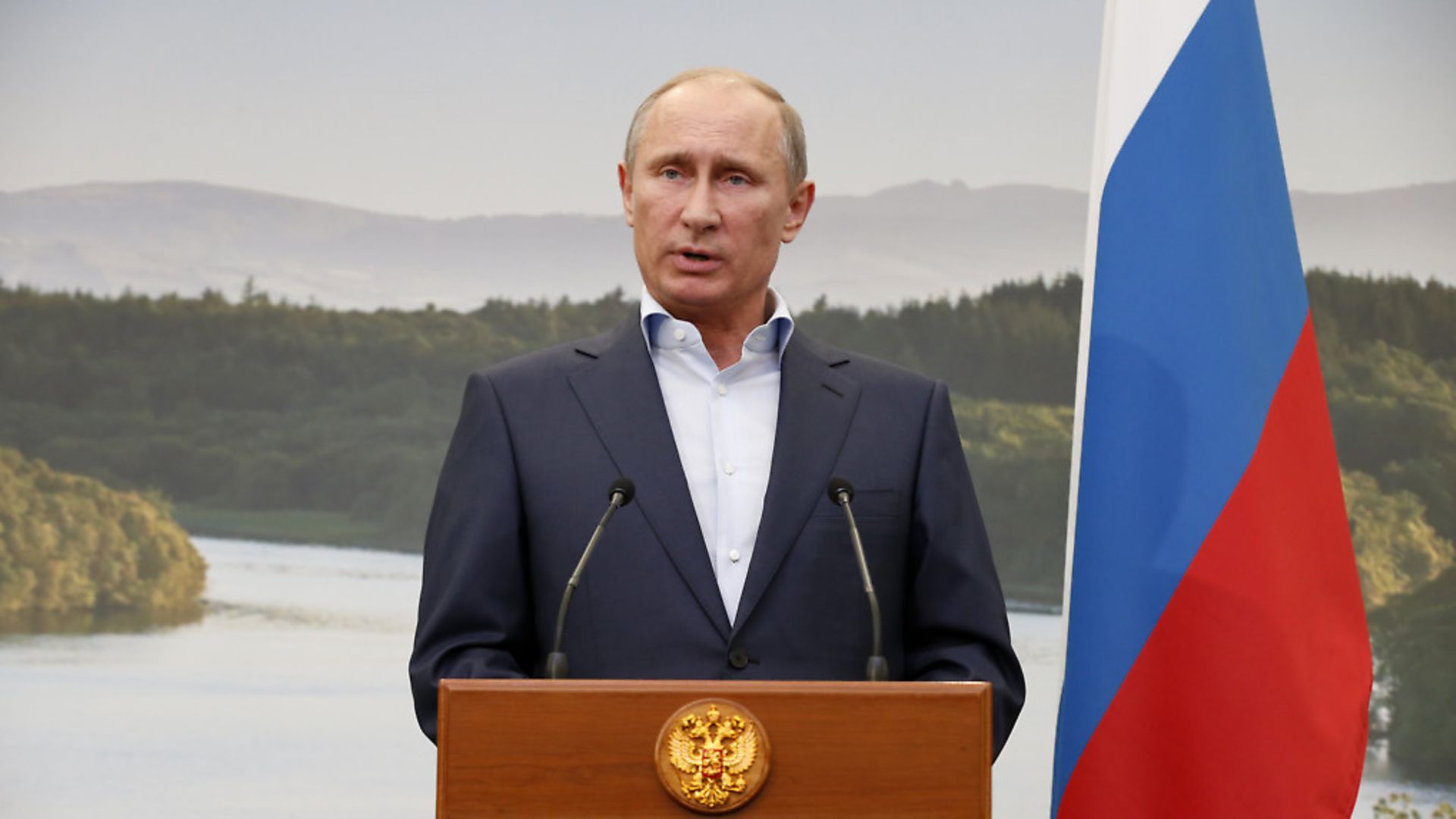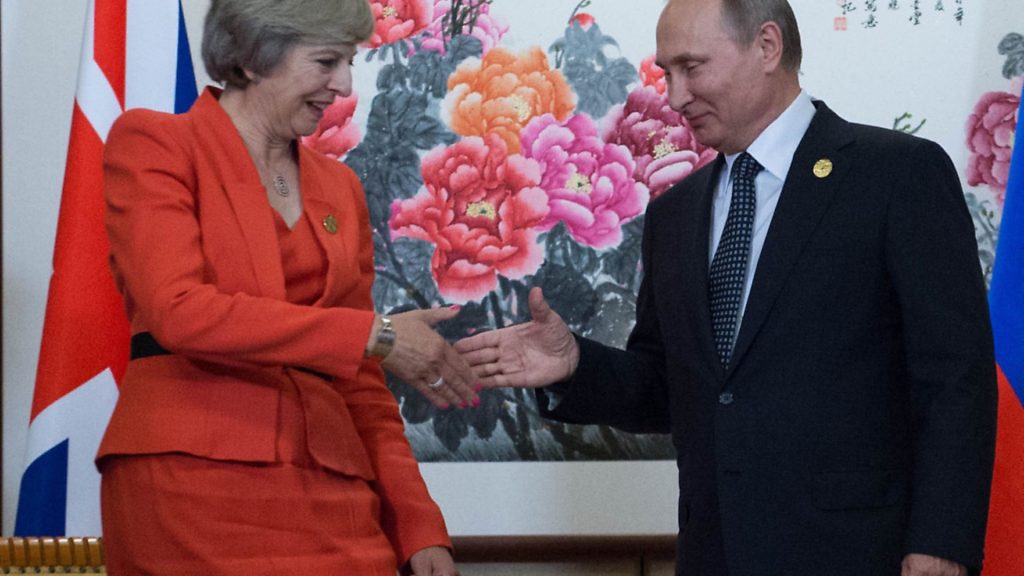
Russia’s leader might seem to be invincible, but in fact he is less secure than he appears, and 2018 could be the year that proves it, argues PAUL KNOTT.

Vladimir Putin is often portrayed by the Western media as a sinister genius.
In reality, he is little more than an unprincipled opportunist. His regime is more fragile than it looks at first glance and could be in for a difficult year in 2018.
Kremlin spokesmen have described Russia’s banning from the 2018 Winter Olympics in South Korea as a ‘humiliation’. For once, they are telling the truth. The suspension is painful for a country which, more than most, sees the Olympic medals table as a measure of national virility.
The Olympic ban is the punishment for Russia’s massive state-sponsored doping programme at the last Winter games, which it hosted in Sochi, in 2014.
A World Anti-Doping Agency (WADA) investigation found that Russia’s athletes were given performance-enhancing drugs in accordance with a strategy directed by government ministers. The FSB (Russia’s state security service and successor to the KGB) ensured the programme initially evaded detection by surreptitiously switching the doped athletes’ urine samples for clean ones.
Hosting the Winter Olympics in 2014 had been intended as a huge prestige project for Putin. The $50 billion splurged on Sochi was more than three times as much as the UK spent on the (far larger) 2012 Summer Olympics in London.
As so often with Putin, the short-term tactical triumph has turned into a long-term strategic blunder. Investigations have shown how much of the inflated budget was diverted into the pockets of cronies of the regime, giving another glimpse into the grotesque corruption found in Russia today. Now, the doping scandal has exposed a willingness to risk the health of hundreds of fit, young athletes for the sake of Putin’s personal glorification.
And while the regime struggles to cope with the embarrassing consequences of the apparent success of Sochi, there are signs that Putin is increasingly anxious about the second of the two global events he obtained from international sports federations.
The 2018 FIFA World Cup in Russia is, at least, less likely to be subverted by state-sponsored doping. Football, with its many variables, is harder to influence with illegal drugs than most Olympic disciplines. And the performance-enhancing substances required to boost the prospects of a Russian national team currently ranked 65th in the world have probably not been invented yet.
The World Cup should, of course, have been removed from a country that is carrying out an illegal military occupation of a fellow FIFA member, Ukraine. But having the eyes of the world focused on Russia does give campaigners an excellent opportunity to draw attention to its human rights abuses and lack of freedom.
Meanwhile, the tournament venues will again stand as monuments to the chronic corruption of Russia’s mafia state. More Russians might be encouraged to ask why their wealthy rulers are still spending substantial sums on building unnecessary sports stadiums. This question is now more acute after several years of economic struggle caused by lower oil prices, maladministration and international sanctions.
Political events in the intervening months before the World Cup takes place next summer are likely to make the scrutiny it brings even more uncomfortable for Putin.
A presidential election is scheduled for March 18, 2018. The electoral process is already heavily rigged to guarantee a big Putin ‘win’.
But he faces the difficult decision of whether to allow genuine opposition candidates to run, notably the gifted communicator, Alexei Navalny. The election campaign would give Navalny a platform to draw further attention to the Putin administration’s rampant stealing from ordinary Russians.
Navalny has already been subject to violent attacks and trumped-up criminal charges. Further assaults on him inspired by the authorities cannot be ruled out. But the likeliest option is that they will simply ban him from participating in the election. Taking this step would confirm the illegitimacy of Putin’s ‘victory’ and risk sparking a repeat of the mass anti-Putin protests that took place in 2011-12.
Events outside Putin’s control promise to be even more significant. The pace of the Mueller Inquiry into alleged links between Donald Trump and Russia suggests that further damning revelations may be forthcoming in early 2018.
As well as investigating manipulation of the 2016 US election campaign, Mueller’s team are reported to have subpoenaed information from Deutsche Bank. The bank has previously been fined heavily for failing to prevent money laundering by Kremlin-connected Russian organised criminals. It also lent millions of dollars to Trump when other financial institutions declined to do so. This strand of the inquiry may unearth the reason for Russia’s apparent hold over Trump.
Pressure for tougher sanctions against Putin and his associates is already growing in the US in any event, despite Trump’s efforts to stall their implementation.
Former Vice-President Joe Biden is believed to be considering a run for the White House in 2020. He recently co-wrote a widely-publicised piece in the influential Foreign Affairs journal arguing for a much more aggressive approach to Russia.
Biden noted how the power of Putin’s ‘cabal of former intelligence officials and oligarchs… remains brittle at the core’. He went on to propose strong measures to ‘impose costs on Russia for its violations of international law and other countries’ sovereignty’, including ‘brazenly assaulting the foundations of Western democracy’.
As misdeeds of Trump’s campaign are further exposed and his hold on the presidency ebbs away, it is easy to see advocating stronger action against his Russian backers becoming a badge of honour for those seeking to succeed him in the White House. They will have the full support of many European leaders whose countries have also been the target of Russian interference.
Elsewhere in the world, Putin’s attempts to ‘make Russia great again’ by destroying the lives of other people are beginning to falter too.
Russia’s military invasion of Eastern Ukraine has sunk into squalid gangsterism. Both it and the other piece of Ukrainian territory illegally occupied by Russia, Crimea, are proving to be a strain on the already-stretched Russian treasury.
While the occupation has hurt Ukraine, as Putin intended, it has also alienated most of the population of Russia’s once-closest neighbour from it for the foreseeable future.
Ukraine was invaded because Putin was terrified it was turning into a cleanly-governed democracy that would set an awkward precedent for Russia. But rather than blocking this trajectory, the only post-invasion political debate in Ukraine is over the speed and effectiveness of the transition.
Russia’s rescue of President Assad, by bombing the Syrian people into submission, is also running into difficulties. This unsavoury ‘success’ was accomplished by allying Russian air power to the ground fighters of Iran’s Revolutionary Guard Corps. But rather than melting away to allow Russia to reshape the wreckage of Syria to suit its purposes, the shock troops of Iran’s Islamist hardliners are now pursuing their own interests.
The Revolutionary Guards intend to stay in Syria to profit from reconstruction contracts and build puppet militias like the Hezbollah forces it created in Lebanon. These steps by Russia’s erstwhile Iranian partners are in direct competition to its own efforts to exert control over Syria. They also complicate Moscow’s aim of using Syria as a foothold to expand its influence in the Middle East.
Russia’s international misconduct is to some extent underwritten by its alliance with the more powerful Chinese. Both countries’ rulers are allergic to liberal democracy.
They coordinate their presence on the UN Security Council to block any initiatives that might inhibit their ability to abuse their citizens at will. But the shallow Sino-Russian marriage of convenience has a deep flaw.
China is the greatest beneficiary of globalisation and the international system that underpins it. Russia’s attempts to disrupt global stability are contrary to China’s interests, as well as the West’s. This fissure could be exploited by clever Western diplomacy to divide the duo.
Polls indicate that Putin’s overseas escapades are still distracting enough of the Russian public’s attention from his domestic failings. But popularity ratings matter little in such a propaganda-distorted, authoritarian environment. Further, well-targeted Western sanctions would undermine the real foundations of Putin’s rule.
Like a mafia godfather, Putin’s power rests on his ability to settle disputes between the subordinate gangsters and share out the spoils satisfactorily.
The billionaires in his circle have been happy to pay tribute to him for as long as this enables them to milk the Russian economy and stash the proceeds in the West (mostly), often along with their families.
The Russian elite will start to question the value of keeping Putin in power if his actions cause further personal financial sanctions and travel bans to be imposed on them, curtailing their access to their assets.
Putin and his cronies resemble playground bullies on a grand scale. They often strike out aggressively to mask their own insecurities but struggle to cope when subjected to concerted pressure in return. 2018 could be the year when we find out just how much push back it will take for Putin’s regime to crumble.
• Paul Knott is a writer on international politics. He spent 20 years as a British diplomat, with postings to Romania, Dubai, Uzbekistan, Ukraine, Russia and the European Union in Brussels.
Warning: Illegal string offset 'link_id' in /mnt/storage/stage/www/wp-includes/bookmark.php on line 357
Notice: Trying to get property 'link_id' of non-object in /mnt/storage/stage/www/wp-includes/bookmark.php on line 37






